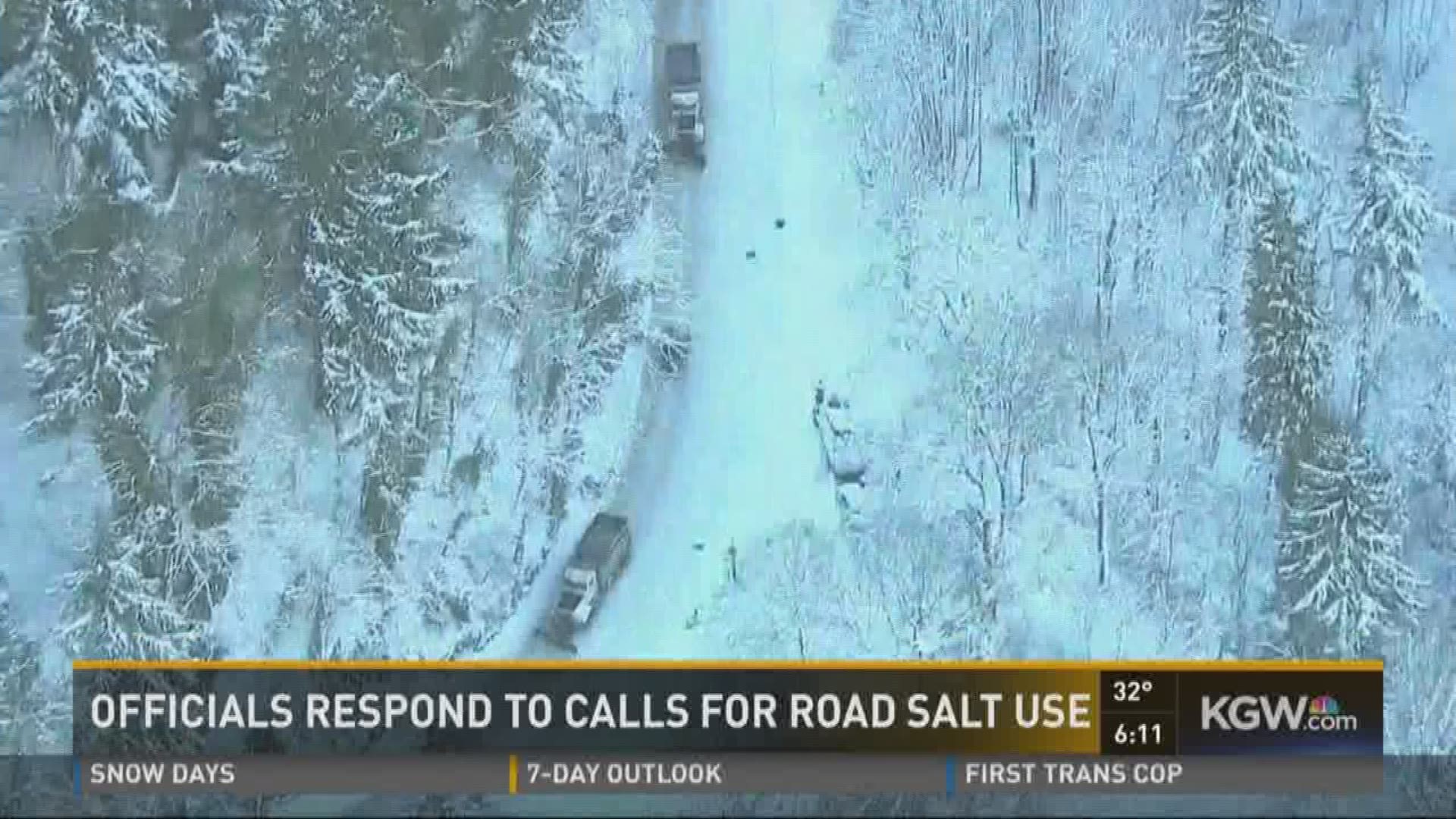PORTLAND, Ore. -- For the last several weeks, many people have been voicing frustrations that Oregon doesn't use salt to de-ice the roads. Salt has worked for decades in dozens of other states, what is Oregon waiting for to use it here?
The Oregon Department of Transportation said it knows salt works wonders melting ice, but there are concerns because it would ultimately get washed into our storm drains which flow to a sewer treatment plant to be cleaned before going into the river.
ODOT is now studying whether the tons and tons of salt that would be needed would corrode those old metro-area pipes. Can treatment plants handle it? Or will fish suffer?
"It affects the roads, the steel in the bridges and the concrete and it affects your car. With this storm, how many times would we have to lay down salt?" asked ODOT spokesman Dave Thompson. "How many tons of salt would we have to lay down? That would affect a great deal of infrastructure. All that salt stays on the road or washes off into the environment. It's not picked up, it's now part of our environment. Is that what people want?"
"This is not acceptable," said Portland resident Suenn Ho as she walked down a still icy Southeast Hawthorne six days after the historic snowstorm. Also on Hawthorne we found Nina Frick who said, "I do think let's get some salt and gravel going, I think salt's reasonable."
KGW talked to city transportation Commissioner Dan Saltzman over the phone at home since city offices were closed Tuesday due to the threat of freezing rain.
We asked Saltzman why is Portland so behind on the use of salt when it's proven effective in so many other states and cities?
"It's not the silver bullet that people are looking for but we are going to give it an honest evaluation about more widespread use of it," he said.
Over the weekend, the Portland Bureau of Transportation issued a statement saying their salt tests didn't work any better than de-icer on three locations around Portland.
Commenters on KGW.com didn't buy it. Saltzman responded by saying, "We used it on a limited basis. Those tests over the weekend aren't sufficient to conclude one way or another the way the city goes in. I have said it'll be a public discussion about the use of salt and it'll be a council decision." Saltzman also explained that using salt could jeopardize Portland's "Salmon Safe" certification.
ODOT believes they used salt on the roads up until the 1950s but can't find records stating for sure or about why it stopped. Officials were blunt, saying they're not dumb, they know it works, but at what environmental and infrastructure cost?
"It would require a great deal of salt to solve this problem," Thompson said. "We would have to salt a very large area, we would have to blanket that area every single day, maybe multiple times. We're not willing to do that at this point. I think the community does need to weigh in and help make the decision for the state as to what their values are in terms of balancing the environment against the speed of returning to normal after a storm."
If you thought money factored into why salt isn't used, it doesn't. It turns out, road salt is dirt cheap. ODOT said it can buy one ton of it, for $1. Compare that to $1 per gallon of the chemical de-icer, magnesium chloride, that is used now. ODOT said it takes one ton of salt to clear a mile of road, while it takes 30 gallons of magnesium chloride to clear the same space. In the city of Portland, there are 2,000 miles of roads.
Officials want the public to decide if it's worth it to the environment.
"I am going to take a look at this and make sure this discussion doesn't disappear when the snow melts and make a decision one way or another on the use of sodium chloride or road salt," Saltzman said.
To let ODOT know your feelings on salt use, you can email them at askodot@odot.state.or.us.

